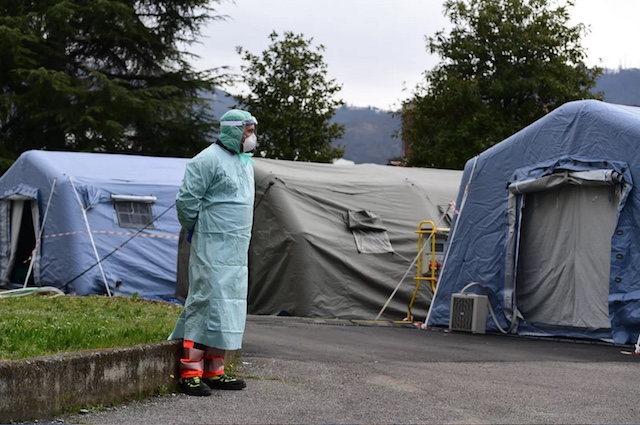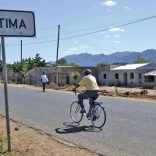Mozambique: Two missing following shipwreck in Metuge
“Sometimes I have to think what day of the week it is today” Mozambican at the new epicentre of the virus

Brescia. Italy. [Photo: A Verdade]
About 500 Mozambicans are living in Italy, at the current epicentre of the new coronavirus pandemic, where 368 people died on Sunday alone.
“So far there are no Mozambicans infected, although there are many in the north [of Italy],” Sofia Gonoury, president of the Mozambican community in Italy, told @Verdade. As for Bernardo, a student in the region most affected by Covid-19, the most difficult part of quarantine “is that you don’t know how long will life be like this. Sometimes I have to think what day of the week it is today!”
The Department of Civil Protection of Italy on Sunday (15-03) updated the number of those infected with the new coronavirus to 24,747. There were 3,590 new patients registered in the last 24 hours, and 368 people died, bringing the toll to 1,809.
Faced with silence from the government of Mozambique, @Verdade managed to contact some of the Mozambicans in Italy by phone.
Sofia Gonoury revealed that there are about 500 Mozambicans in the European country at present, and that no Mozambicans are as yet infected, although there were many living in the north of the country.
Sofia, who is based in Umbria, in the centre of Italy, told @Verdade that she has been quarantined with her husband and son since the 2nd of March. “All unnecessary activities are suspended. Shops, restaurants, bars, schools are closed. We follow the guidelines of the Ministry of Interior and Health, to stay at home and only leave for a reason of force majeure or vital importance.”
For Sofia, living in Italy for several decades already, “what impresses me most is that the roads and squares are completely deserted”.
The president of the Mozambican community in Italy shared with @Verdade that the solution was “to strictly follow the guidelines of the Italian government: contagion prevention is the best way to defend ourselves”. She also told us that, on Saturday (14), “we had the first coronavirus death in my region, unfortunately”.
Quarantine “creates a kind of frustration because you don’t know when it will end”
Bernardo, a Mozambican student in the province of Brescia, in the Lombardy region, where the outbreak of the new coronavirus began and has reached dramatic proportions, told @Verdade that “in January, I realised that the situation was critical, but it seemed a distant thing! A few weeks later, I saw in the news that two cases had been registered in Italy, a Chinese couple in Rome, but it seemed that everything was under control.”
“Then the first case was discovered in the Province of Lodi, here in Lombardy and we quickly heard of new cases in the neighbouring provinces. By that time, it was the 21st of February. From there, the numbers just went up. Clearly, concern grew, and I realised that it was a serious situation, and that we were all at risk of being infected,” he told @Verdade. Since then, he has been in quarantine, and classes have stopped at the university where he is studying. “This week we started online classes, since no one can go out.”
“Life means being at home or in the yard! The fact of not living alone is a big help, at least on a psychological level, because you can talk, you just respect the established distance. Another thing is, that we don’t know how long life will be like this – sometimes I have to think what day of the week it is!” the Mozambican student told @Verdade.
According to Bernardo, to go out, even in the direst necessity, quarantined citizens must fill out a document provided by the Italian government. “Just go to work, you must have the permission of the doctor and the head of the company! To go to the supermarket, you need the doctor’s authorization, but it must be at the nearest supermarket, and there cannot be more than two people in the car.”
“My biggest concern is not so much personal, it is the social situation, and also what’s to come. Families don’t know what to do with children all day! And people who live alone, old people. In a way, this creates a kind of frustration, also because we do not know when it will end,” Bernado says.

The term quarantine emerged in Italy in the 14th century, at that time of the bubonic plague, which killed more than a third of the population of Europe. The government of the City of Venice, fearing that the plague would be brought by the boats that arrived at its ports every day, laid down that all boats would be isolated for 40 days before passengers could disembark.
@Verdade also discovered that, with the exponential growth of cases in Italy and pressure on beds in intensive care units, the Italian College of Anesthesia, Analgesia, Resuscitation and Intensive Care predicts that the lack of resources may mean that doctors and nurses will have to choose who will be treated, according to their chances of survival.
By Adérito Caldeira












Leave a Reply
Be the First to Comment!
You must be logged in to post a comment.
You must be logged in to post a comment.